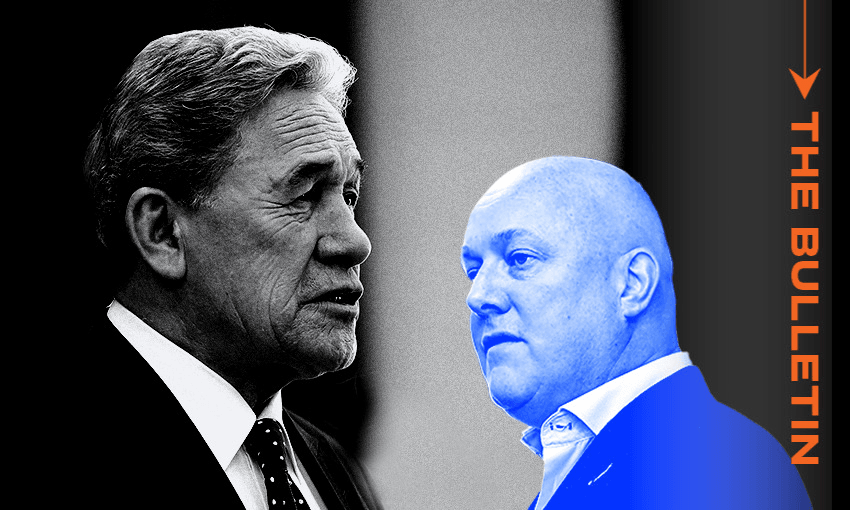Winston Peters wants to scrub the ‘woke DEI’ from our public service. Christopher Luxon says he may have a point, writes Catherine McGregor in today’s extract from The Bulletin.
To receive The Bulletin in full each weekday, sign up here.
Peters has a point on diversity, equity and inclusion, says PM
Christopher Luxon has thrown his (cautious) backing behind New Zealand First’s bill to “remove woke ‘DEI’ regulations” from hiring practices in the public sector. “I’d just say, when we took the keys to the place, it was pretty woke, and it’s entirely appropriate that we look at what else we can do to make sure the public service delivers,” Luxon told reporters on Tuesday. NZ First would need to get very lucky for their member’s bill to be drawn from the ballot, but Luxon says he’s asked Judith Collins, who’s been given responsibility for overhauling the Public Service Act, to look at whether any of the bill’s proposals could be incorporated into her refresh, RNZ’s Craig McCulloch reports.
Returning to a country ‘founded on meritocracy’
What are those NZ First proposals, exactly? The party’s Public Works Act (Repeal of Diversity and Inclusiveness Requirements) Bill would scrap the requirement that public service employers ensure their workforces reflect societal diversity, remove mandates promoting diversity and inclusiveness in public service workplaces, and end the public service’s consideration of “workforce diversity and inclusiveness”. The bill would also remove “requirements for chief executives and boards to promote diversity and inclusiveness as part of being a ‘good employer,’ including specific references to Māori involvement”. Leader Winston Peters said the bill was needed because “New Zealand is a country founded on meritocracy, not on some mind-numbingly stupid ideology.”
As the NZ Herald notes in an editorial (Premium paywalled), five years ago NZ First voted in favour of the same law it is now keen to repeal, with then deputy leader Fletcher Tabuteau saying it would “deliver better outcomes and better services” by “creating a modern, agile and adaptive public service”.
Peters’ DEI target claim ‘total bulldust’
Curiously, nobody seems to have come up with any real evidence of people wrongly appointed to the public service because of diversity rules. Asked for examples of wokeness in government, Luxon mentioned Labour’s wellbeing budgets, co-governance, and targets to reduce prisoner numbers – but not any hiring practices. Peters likewise struggles to give an example, but insists the act as it stands is forcing “diversity, equity and inclusion targets” on government agencies.
“To borrow one of Peters’ gentlemanly expletives, that claim is total ‘bulldust’,” writes Stuff’s Jehan Casinader. “The law says nothing about targets or quotas. It does require public sector bosses to promote diversity and inclusion by building a workforce that reflects our society.”
Casinader continues: “Peters wants hiring decisions to be made solely on ‘merit’. Who would disagree with that? But ‘merit’ no longer means what it might have when Peters joined the workforce in the 1960s as a young schoolteacher.”
‘Woke’ banks also in the firing line
The bill isn’t NZ First’s only legislative parry in the war against woke. Last month, MP Andy Foster’s “woke banking bill” was pulled from the biscuit tin, meaning it’ll proceed to a first reading. The bill aims to prevent the debanking of customers based on “murky ‘environmental, social or governance’ [ESG] moralising”. Debanking – the denial of banking services – has been a hot topic in rightwing circles in recent years. In 2023, UK Reform Party leader Nigel Farage accused private bank Coutts of closing his account due to his political views, prompting a media firestorm. Here at home, to give two examples, KiwiBank has pledged to stop working with coal companies and BNZ closed Gloriavale’s accounts, citing human rights concerns.
Lawyers at both Chapman Tripp and Russell McVeagh say Foster’s bill is poorly written and unworkable in practice, due to its allowance for banks to still withdraw services “for a valid and verifiable commercial reason”. To take one example, the risks associated with climate change are arguably both an “ESG consideration” and a “verifiable commercial reason” for banks to refuse a loan, making them a grey area under the proposed law. Such a law change would also provoke uncertainty within the financial services sector, scaring away foreign investment, warns economics professor Martien Lubberink in an article entitled ‘How the war on ‘woke banking’ could backfire on New Zealand’.
Related:


